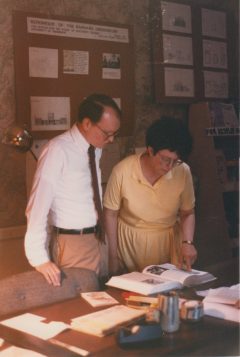Encyclopedia of Southern Culture Celebrates 30 Years
Celebration set for Nov. 13 commemorates landmark reference work
Written By Rebecca Lauck Cleary
OXFORD, Miss. – For three decades, the Encyclopedia of Southern Culture has fostered a deeper understanding of the South, encouraging everyone to “read y’all about it.” The Center for the Study of Southern Culture at the University of Mississippi is inviting everyone to an anniversary celebration for the ambitious, unique project that embraces all the history, arts, literature, politics, folklore and environment in this colorful, diverse region.
The celebration begins at 5:30 p.m. Nov. 13 at Off Square Books, 129 Courthouse Square in Oxford, and continues at the Powerhouse Community Arts Center, 413 South 14th St., from 6 to 9 p.m. for food, film, music and drinks.
Charles Reagan Wilson, the center’s former director and co-editor of the encyclopedia with Bill Ferris, believes the encyclopedia helped spur the cultural study of the South, as well as a renaissance in regional studies.

“The volume contributed to moving scholarship away from primary emphasis on issues of politics, wars and the economy to issues of culture,” said Wilson, who was the UM Kelly Gene Cook Sr. Chair of History and professor of Southern studies at UM, where he taught from 1981 to 2014. “Afterwards we saw much more attention to the study of music, food, literature, etc.
“Part of that was the volume’s broad and inclusive definition of the South, another scholarly trend that took off in the wake of the volume. We focused major sections on such topics as social class, black life, women’s life and ethnic life – all of which are now major components of Southern studies.”
The Encyclopedia of Southern Culture was a 10-year project developed by the Center for the Study of Southern Culture and published by the University of North Carolina Press in 1989. Contributors to the volume included 800 historians, literary critics, sociologists, anthropologists, geographers, linguists, theologians, folklorists, architects, ecologists, lawyers, university presidents, newspaper reporters, magazine writers and novelists.
Thirty years ago, an Ole Miss news release written by Jim Cleveland stated, “The encyclopedia promises to have a long literary future as the definitive reference on the region,” and, indeed, this statement proves true, as scholars today still reference the 1,600-page reference work. U.S. News and World Report declared it “the first attempt ever to describe every aspect of a region’s life and thought, the impact of its history and policies, its music and literature, its manners and myths, even the iced tea that washes down its catfish and cornbread.”
The encyclopedia’s conceptualization of “the South” as a space with ideological, material and performative aspects shaped the work of scholars grappling with other regions, including the West, New England, the Midwest, Appalachia and Cajun Louisiana.

The volume also spurred encyclopedia-making, and in 2013, the center completed the 24 paperback volumes of the New Encyclopedia of Southern Culture, published by UNC Press. In 2017, the center release the Mississippi Encyclopedia, published by University Press of Mississippi.
The constantly changing nature of the South meant that the encyclopedia, despite its many pages, almost immediately needed updating, and the center has added an online version. The portability of the paperback volumes means that the encyclopedia can enter new spaces, such as a classroom, much easier.
“Both the New Encyclopedia of Southern Culture and the Mississippi Encyclopedia drew their inspiration from the Encyclopedia of Southern Culture and stood on the shoulder of that works’ scholarship,” said James G. Thomas Jr., the center’s associate director of publications.
“Those of us at the center who worked with the encyclopedia consulted afterwards with editors on volumes on many regions across the nation,” Wilson said. “It became an organizational and conceptual model for how to do modern reference works.
“It won the Dartmouth Award from the American Library Association as the best reference work of the year – a tribute to our attempt to provide an encyclopedia that would be accurate and thorough, with the highest scholarly standards.”
Keeping up with those scholarly standards is second-year Southern Studies graduate student Kelly Spivey, who helped plan the Nov. 13 party by creating a Spotify list of songs mentioned in the encyclopedia, including everything from Mahalia Jackson’s “Move on Up a Little Higher” and B.B. King’s “Why I Sing the Blues” to Mississippi John Hurt’s “Candy Man Blues.”
While perusing the encyclopedia for musical entries, Spivey started by looking at the introduction written by Bill Malone, professor emeritus at Tulane University. Once she started making notes, it became clear that music was such a broad topic, starting with songs mentioned in the section might be an easier way to get a handle on it.
“As far as the music section goes, I was pleasantly surprised by the entry on Musica Tejana,” Spivey said. “In today’s climate and the discussions surrounding immigration, that particular entry is a great example of the presence of Latin American influence as far back as the 1700s.”
The artists on Spivey’s playlist will provide inspiration for Oxford musicians Damein Wash and Ricky Burkhead, who will perform at the party. Spivey also researched regional foods touched on in the encyclopedia that will be served at the party, including fried chicken, okra, pork shoulder and pecan pie.
She said she plans to use the encyclopedia in her future studies.
“It has the benefit of covering a lot of topics, which makes it a really good starting point for research,” said Spivey, who earned her undergraduate degree in photography from the Savannah College of Art and Design and worked as a pastry chef for Coquette and Compere Lapin restaurants in New Orleans.
“I will say that some of the information has become dated in some regards since 1989, but that is expected. I’m thinking more about the way things are talked about than the existence of any one entry. It is extremely useful in tracking the trajectory of Southern studies by being able to point to a foundational text.”
Mark Simpson-Vos, editorial director of UNC Press, will attend the festivities and has high praise for the three decades of existence of the encyclopedia. He feels that celebrating the 30th anniversary of its publication is a worthy milestone and feels confident another celebration will take place decades from now.
“If I were to make a list of the 10 most significant books UNC Press has published over the last half-century, it would surely include the Encyclopedia of Southern Culture – and high up in the order, too,” said Simpson-Vos, who joined the press staff in 1998. “By any conceivable measure of impact, the encyclopedia was a landmark endeavor, confirming the South’s place at the very center of American culture, creating new frameworks from which to understand and write about the region and helping to launch a wave of similar state and regional reference works.
“Along the way, the project created durable relationships that continue to nurture UNC Press’s publishing program to this day. It’s no exaggeration to say that UNC Press would not be what it is today if we had not published Encyclopedia of Southern Culture.”
Although this event is free and open to the public, guests are asked to RSVP at http://bit.ly/342U4fh. For more information or for assistance related to a disability, contact Afton Thomas at amthoma4@olemiss.edu or 662-915-3363.
